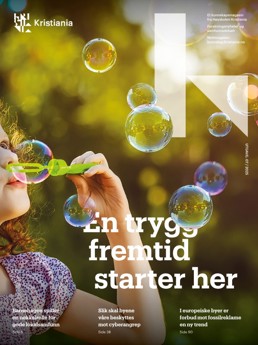Eastern and Middle European work immigrants in Norway face mental health challenges
-
Sist oppdatert
10. oktober 2025
-
Kategori
Traditional integration metrics—employment rates, income levels, and housing stability—fail to capture the emotional and psychological toll of cultural displacement.
SCIENCE NEWS FROM KRISTIANIA: Mental health
Summary:
- Many Eastern and Middle European immigrants in Norway appear well integrated but quietly struggle with serious mental health challenges.
- Cultural clashes, language barriers, and family responsibilities create a hidden "integration fatigue" - the exhaustion of carrying both personal and family adaptation.
- Associate Professors, Miroslava Tokovska and Marta Hustava, point to limited, costly, and culturally inadequate mental health support, leaving many immigrants to suffer in silence.
(This summary was created by AI and reviewed by the editors).
Norway's economic prosperity has long attracted skilled workers from across Europe. Many come from Eastern and Central European countries. While they often have university degrees, secure employment, and competitive salaries, research reveals an unexpected reality: many face profound mental health challenges that remain largely invisible to Norwegian society.
The paradox of successful integration
Labour immigrants from countries like Poland, Ukraine, Lithuania, Latvia, Romania, Slovakia, and Hungary appear to integrate successfully into Norwegian society. Yet beneath this veneer of success lies a complex web of psychological struggles.
Traditional integration metrics—employment rates, income levels, and housing stability—fail to capture the emotional and psychological toll of cultural displacement. These immigrants often arrive healthier and more motivated than the average population—what researchers call the “healthy migrant effect”. Despite achieving outward success, many experience a gradual decline in their mental and physical well-being.
Janteloven represents a cultural shock
For Eastern and Middle European immigrants, the Norwegian cultural landscape presents unique challenges that can trigger significant
psychological stress. The Scandinavian values of egalitarianism, work-life balance, and emotional restraint often clash with the more hierarchical, family-centred, and expressive cultural norms of their home countries.
The Scandinavian values of egalitarianism, work-life balance, and emotional restraint often clash with the more hierarchical, family-centred, and expressive cultural norms of their home countries
The loss of familiar rituals, community structures, and spiritual support systems can create a profound sense of displacement.
The Norwegian concept of "janteloven" (the law of Jante), which emphasizes modesty and collective well-being over individual achievement, can be particularly challenging for immigrants from cultures that celebrate personal accomplishment and hierarchical recognition. This cultural mismatch can lead to feelings of invisibility and undervaluation, despite professional success.
Language barriers create social isolation
While many Eastern and Middle European immigrants arrive with strong English skills, learning Norwegian proves more challenging than anticipated, creating barriers to social integration and professional advancement.
The inability to express nuanced thoughts, emotions, or humour in Norwegian can lead to feelings of intellectual diminishment and social isolation. Professional immigrants often report feeling "less intelligent" or "less interesting" when communicating in Norwegian, despite their expertise and accomplishments.
Family reunification can create integration fatigue
The process of family reunification (familiegjenforening) adds another layer of complexity to the immigrant experience. While reuniting with family members should theoretically provide emotional support, it often introduces new stressors.
Spouses may struggle with their integration challenges, children may face academic and social difficulties, and the financial pressure of supporting a larger family in Norway's expensive economy can be overwhelming.
Perhaps most concerning is the gap between mental health needs and available support
The expectation to serve as cultural mediators for their families while managing their adaptation challenges creates what researchers call "integration fatigue”. Many immigrants report feeling responsible for their family's happiness and success while simultaneously struggling with their psychological well-being.

Read more:
The mental health support gap
Perhaps most concerning is the gap between mental health needs and available support. Private psychological services often exceed 1,500 NOK per session, while public services have months-long waiting lists and user fees, creating substantial barriers for immigrant populations.
Language barriers compound these challenges. While many immigrants speak English, the nuanced communication required for effective therapy often necessitates native-level Norwegian proficiency. The scarcity of English-speaking therapists familiar with immigrant experiences creates additional obstacles to accessing care.
Cultural competency among healthcare providers remains limited. Many therapists lack understanding of the specific stressors faced by Eastern and Middle European immigrants, leading to misdiagnosis or inadequate treatment approaches.

Les Kunnskap Kristianias temautgave:
Breaking the Silence
Research indicates that Eastern and Middle European work immigrants often suffer in silence, reluctant to seek help due to stigma, cost, or lack of awareness about available resources. In many of their home countries, seeking help is often seen as a sign of weakness or failure, diminishing one's dignity, credibility, or perceived capability. The expectation to be "grateful" for opportunities in Norway can prevent individuals from acknowledging their struggles or seeking support.
Addressing these mental health challenges is essential for Norway's continued success in attracting and retaining skilled European workers. Supporting immigrant well-being requires recognition and comprehensive assistance beyond employment alone.
References:
Ims, R. (2022). Immigrants' experiences of the importance and value of work in Norway: Implications for social work. Social Work & Society, 20(1).
Kumar, B., & Diaz, E. (Eds.). (2019). Migrant Health: A Primary Care Perspective (1st ed.). CRC Press.
Laue, J., Diaz, E., Eriksen, L., & Risør, T. (2023). Migration health research in Norway: a scoping review. Scandinavian journal of public health, 51(3), 381–390.
Nessa, B. (2024, 24 September). Flyktningers vei til jobb i Norge er lang og tøff [Kronikk]. OsloMet – Kompetansesenter for arbeidsinkludering (KAI).
OECD. (2022). Skills and Labour Market Integration of Immigrants and their Children in Norway, Working Together for Integration, OECD Publishing, Paris.
World Health Organization. (2023). Mental health of refugees and migrants: risk and protective factors and access to care (Global Evidence Review on Health and Migration (GEHM) series).
Text: Miroslava Tokovska, Associate Professor, School of Health Scienes, Kristiania University of Applied Sciences & Marta Hustava Sipulova, Associate Professor, OsloMet.
This article was also published on sciencenorway on the 13th of September 2025 with the title "These immigrants in Norway face mental health challenges".
We love hearing from you!
Send your comments and questions regarding this article by e-mail to kunnskap@kristiania.no.
Siste nytt fra Kunnskap Kristiania
 Kunnskap KristianiaLes mer
Kunnskap KristianiaLes merVerdien av stillhet
Vi lever i en tid der hvert øyeblikk kan fylles – av lyd, informasjon, samtaler, varsler og tanker. Kunnskap KristianiaLes mer
Kunnskap KristianiaLes merFrykten for å gå glipp av noe skaper uro – og mer scrolling
Problemet med sosiale medier er ikke at de fører til sosial isolasjon. Men FOMO-syndromet skaper stress. Kunnskap KristianiaLes mer
Kunnskap KristianiaLes merNår Tinder møter hverdagslogistikken
Du syntes det var vanskelig å få datingapper til å fungere? Prøv å få det til med hverdagslogistikken til en aleneforelder. Kunnskap KristianiaLes mer
Kunnskap KristianiaLes merHva om du kunne «gå opp i level» underveis i prøven?
I dataspill får du en ny utfordring i det øyeblikket du er klar for den.

Meld deg på vårt nyhetsbrev





